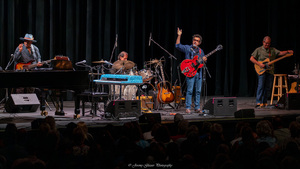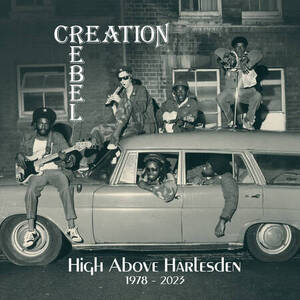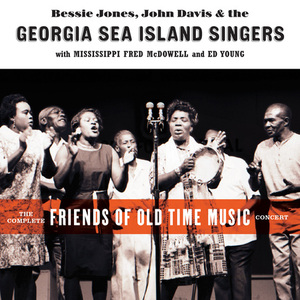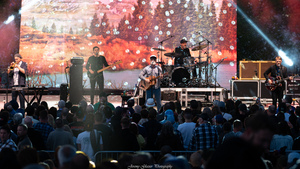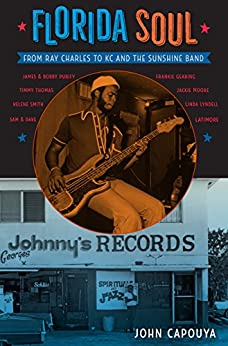
Covid Diary #2
Florida Soul and Gospel Roots
by Bob Pomeroy
Being on lockdown for the Covid-19 outbreak has it’s upsides. By the time this is over, my apartment will be clean. I also get to attack that pile of books I bought and just haven’t gotten around to yet. The first book I tackled after being furloughed was Florida Soul: From Ray Charles to KC and the Sunshine Band by University of Tampa professor, John Capouya. When I think about Soul music, usually Memphis, Philadelphia and Muscle Shoals come to mind, not Florida. Since I live in the Sunshine State, this book caught my attention.
Capouya’s book actually confirms that Florida was something of a backwater. The biggest names – Ray Charles or Sam Moore of Sam and Dave fame, found fame after moving out of Florida. Other characters given their due, like Nobel “Thin Man” Watts, Chocolate Perry were mainly sidemen. That doesn’t mean the stories aren’t interesting. The story about Ray Charles riding a bike down Main Street in Tampa is borderline unbelievable.
Some of the stories are fascinating footnotes in music history. We all know about Chubby Checker’s rise to stardom with the Twist. What isn’t so well known is that the Twist came from Tampa. Hank Ballard saw some kids doing a dance in Tampa and wrote a song to go with it. The Hank Ballard and the Midnighters original version was released as the B-side to “Teardrops on Your Letter.” It went to number one when Checker did his version, which was almost exactly the same as Ballard. I guess that’s another example of being in the right place at the wrong time.
Linda Lyndell was raised in rural Florida where she went to the nearest church every Sunday so she could sing. It just happened that the nearest church was an African Methodist Episcopal church and Linda was a little white girl. She grew up steeped in the same gospel traditions as other Soul singers. She eventually graduated to singing professionally with Lavell Kamma and the 100 Hour Counts on the chitlin circuit. Her story is a glimpse into race and the music biz in the 60’s. Linda did have a hit single with “What A Man,” but was hounded out of the music by people angry at a white girl singing Soul.
Most of the stories in Florida Soul make at least a brief stop at the TK Studio in Miami. The TK label wanted to be the Motown of the South. Their producers and session men turned out singles by R.C. Robinson, Helene Smith and Betty Wight before they when on the fame elsewhere. Harry Wayne Casey was an exception. The session player and producer at TK had his biggest hits as leader of KC and the Sunshine Band for TK.
The Chitlin Circuit and the limitations imposed by Jim Crow laws is a common feature of these stories. Capouya gives us a glimpse of the thriving African American cultural scene in Miami, Tampa, Jacksonville and St. Petersburg. Those institutions are pretty much just memories now. The other thread that connects these stories is the role of gospel music in nurturing young talent.
While I was reading Florida Soul, a gospel record by the Legendary Ingramettes, Take A Look in the Book showed up in my mailbox. I’ll admit that I don’t go out of my way seeking out gospel records. Since I’d been reading about the huge impact gospel music had on soul (some say soul is gospel music with secular lyrics), I was in a receptive mood.
The Legendary Ingramettes have a compelling story. They are a family band who have been singing together for over 60 years. The band was founded by Maggie Ingram as a way to keep the family together and fed when her husband walked out on her. Maggie based the groups sound on the male gospel quartets of the 1940’s and 50’s. The Legendary Ingramettes took those harmonies and made it all work with women’s voices. Maggie Ingram died in 2015 and her daughter Almeta Ingram-Miller took up leadership to keep the legacy alive.
Take A Look in the Book is the group’s first effort led by Almeta. The sessions were recorded as part of the pretty much live to preserve the raw energy of the performances. The album kicks off with a piano boogie leading into Almeta testifying about her life with the backing singers urging her on with their refrain of “come on.” It’s a sound and rhythm that demands movement, that demands your involvement, that’s perfect for moving the congregation or getting people dancing in a juke joint.
The fine line between the secular and the sacred is wonderfully illustrated by the Legendary Ingramettes version of the Bill Withers classic, “Grandma’s Hands.” Bill Withers and the Ingramettes are singing the same lyrics. Withers is a meditation on how important his grandmother was to him growing up. The Ingramettes really emphasize the emotions in the lyrics. Both versions are powerful with a slight shift in emphasis shifting the song from secular to sacred.
I’m pretty much agnostic, which is why I’ve never really sought out groups like the Legendary Ingramettes. I have to admit that the passion in these performances really moved me. I also hear how performers like Ray Charles or Sam and Dave took the passion they learned in the church and brought it to the nightclub. Saturday night sing it to the sinners, Sunday morning sing it to wash away the sin. ◼


